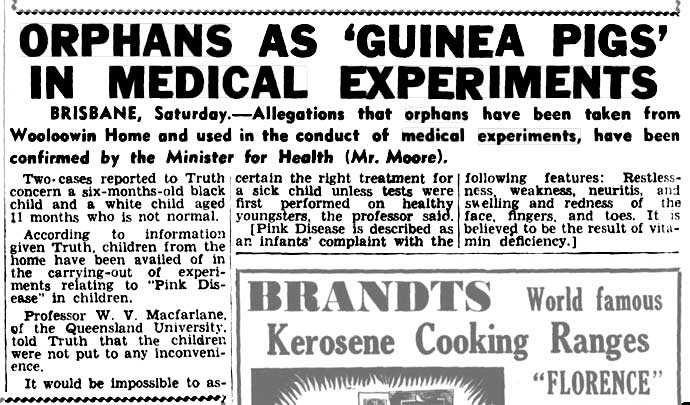'Lab Rats' - Medical experiments on Aboriginal children in care
Eugenics is a set of beliefs and practices that aimed at 'improving' the genetic quality of a human population to Western Standards.
During the twentieth century, babies and children in orphanages and Homes, mainly made up of stolen Aboriginal children, were used as subjects for medical experiments.
Reports from the Senate Inquiry into Children in Institutional Care contained details of studies carried out by the Walter and Eliza Hall Institute and the Commonwealth Serum Laboratory (CSL) between 1945 and 1970.
Many other medical institutions also carried out experiments on Aboriginal children in 'care' but most of the records have been systematically destroyed or lost.
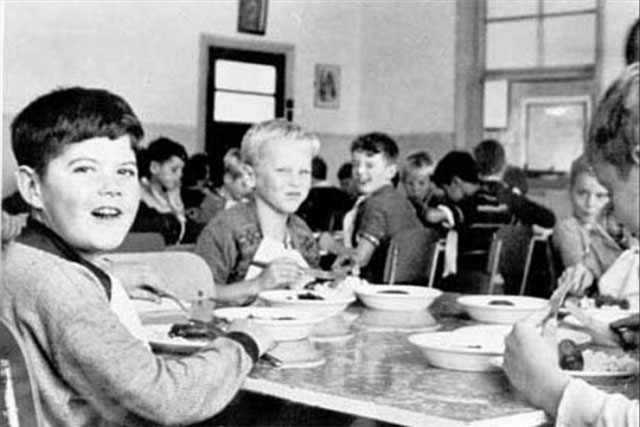
Around 500,000 children grew up in government-run institutions and foster care, records of medical and other experiaments on children in many of the institution have been destroyed or lost.
Barbara Miller ABC PM 18 Nov 2009
The University of Melbourne has issued an apology to the Forgotten Australians over medical experiments performed on children in state care.
ABC News report: Melbourne University apologises for experimenting on children in care
In an email to staff and students, the university's vice-chancellor expressed particular regret for the part played by researchers linked to the institution.
Following the revelations in the Nuremberg trials of the extent to which Nazi doctors had experimented on children, a code of conduct was developed for obtaining consent in medical research.
In the following decades that code was refined and nowadays many countries, including Australia, have their own strict guidelines for the use of children in medical experiments.
But before that it was fairly common practice for children in care in particular to be used in experiments, usually without consent.
In 2004, Queensland Labor Senator Jan McLucas chaired a Senate inquiry into the experiences of the Forgotten Australians.
"I think it was quite surprising to all of the committee members the extent of use of children for a range of trials, of vaccines, of other medical procedures, including horrifically enforced gynaecological examinations of young girls as almost routine," she said.
"It happened in a lot of places in Australia; drugs were provided to children under approved trials, events that would never happen nowadays of course, but it was rather extensive and fairly shocking."
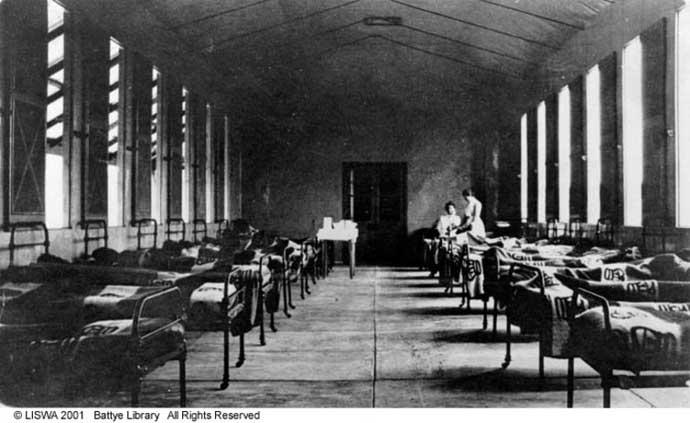
Hospital Ward Dorre Island whrer inmates were subjected to invasive interventions.
'Deep regret'
Medical Experiments on State Children
The abuses towards First Nations peoples over the past 229 years should make all of those arguing about rights, morality, power, and the separation of Church and State, in the debate on stem cell research, sit up and take notice.
Its members are the victims of the lack of church and state separation in past medical experimentation on this continent. They are the children who lived in child welfare institutions and were used as real life “lab rats” in the pursuit of medical breakthroughs.
In some of the material sourced by the inquiry, a researcher from the University of Melbourne is named as being involved in experiments using children in care.
In an email sent to staff and students, the university's vice-chancellor, Glyn Davis, said it was appropriate that the university took the occasion "to express its deep regret for the part played by researchers linked to its community in vaccination research trials conducted after World War II using children in orphanages as subjects".
The email says the counselling services of the university are available to Forgotten Australians who are part of its community.
But the president of Care Leavers Australia Network, Leonie Sheedy, says that is not good enough.
"I read the press release that said that counselling would be available, but there was no number given for people to contact, so how serious are they at offering support and counselling to these people who've been used as experiments?" she asked.
Call for information
Steve Quinn was in a Church of England boys school at Carlingford in New South Wales in the early 1960s.
He believes he may have been a subject in a scientific experiment of some kind and he is calling on all universities and institutions to take a good look at their records.
"When I contacted one university they told me the professor who had run the program had died and that person's records had been thrown out," he said.
"I don't think that's good enough. I was concerned that that institution, and probably others as well, want to hide this information for legal reasons, because obviously if they've done this without getting permission from people they could be sued.
"I think they've got to now be prepared to put those legal concerns aside and find whatever they can find and make a real effort to dig the information out and let people know."
'Tweaking some consciences'
Senator McLucas agrees that institutions should look into their records and try to right past wrongs.
"I welcome this move from the University of Melbourne to recognise that their researchers in the past have violated - in my view - these children," she said.
"But there is more that can be done. Our community recommended that any institution that holds records about any child that was kept in care should make those records freely available to the people who were institutionalised.
"And not only just make them available, they should go out of their way to try to locate people.
"I think that Monday's momentous event probably has tweaked some consciences around the country and to that effect, I encourage other institutions who may hold information to take this step; to apologise and then act on that apology."
PM contacted the Walter and Eliza Hall Institute in Melbourne, which was identified in the Senate inquiry as having used children in care for experiments, to ask if they would also consider offering an apology to the Forgotten Australians.
The institute did not respond to the request.
Apology for past experiments on Aboriginal people
Media Release University Adelaide 8 February 2002
Adelaide University has apologised for scientific experiments conducted on Aboriginal people by some university researchers in the 1920s and 1930s.
The experiments have been documented in a new book, The Cultivation of Whiteness: Science, Health and Racial Destiny in Australia by a Melbourne academic and medical doctor, Dr Warwick Anderson, from the University of California. The book is due for release next month.
"Adelaide University acknowledges that many of the tests and experiments carried out on Aboriginal people in South Australia in the name of science in the 1920s and 1930s were degrading and, in some cases, barbarous," said Vice-Chancellor Professor Cliff Blake. "On behalf of the University community, I express my deep sorrow for what happened. I apologise to the descendants of all those who were subjected to this treatment and to their communities."
Professor Blake said that the practices of the 1920s and 1930s would never be permitted by any Australian university today. Modern university researchers were accountable to ethics committees and to a range of other review bodies, he said. Professor Blake said that during its 128-year history, Adelaide University had been enriched beyond measure by Aboriginal and Torres Strait Islander cultures. Indigenous cultures had been shared with, and incorporated into, the work of past and present University academics, bringing great honour to the institution and its staff, he said.
On National Sorry Day 2000, Adelaide University apologised publicly for the forced removal of Aboriginal children from their homes. In September last year, the University's Vice-Chancellor's Committee agreed a Statement of Reconciliation committing the University to:
- promoting an understanding of Indigenous issues, cultures and history in programs and courses;
- directing strategies towards increased participation of indigenous peoples as students and staff in the full range of University activities; and
- contributing to the process of Reconciliation by educating the Australian community about the cultures languages, history and contemporary experiences of Australia's indigenous peoples.
The Statement of Reconciliation concludes: "Adelaide University is deeply sorry for all of these injustices. And so, we pledge ourselves to stop injustice, overcome disadvantage, and respect the right that Aboriginal and Torres Strait Islander people have to self- determination within the life of the nation."
Aborigines 'used in experiments'
BBC News 15 April 2008
Many children were taken from their homes as part of an official policy
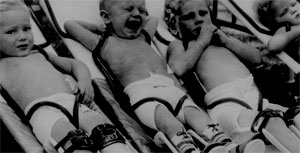
Some Aboriginal children in Australia were once used for medical tests, it has been claimed.
Aborigine rights campaigner Kathleen Mills said she had heard of children being injected with a leprosy treatment and becoming very ill.
She said many members of the "Stolen Generations" - Aborigines taken from their homes and raised by white families - had similar experiences.
Senior politicians said they had never heard such claims before.
Ms Mills was speaking outside a Senate hearing in the northern city of Darwin, which is investigating possible compensation for the Stolen Generations.
Rudd's apology
Ms Mills, who is a member of the Stolen Generations Alliance of Aborigines, told the Senate hearing: "As well as being taken away, they were used... there are a lot of things that Australia does not know about."
She later told journalists she had heard how children were injected with experimental treatments for leprosy.
"My uncle worked as a medical orderly, he gave me the name of the medicine," she said.
"It made our people very ill and he said the treatment almost killed them."
Greens leader Bob Brown said medical records "needed to be scoured" to find out if there was any truth in the claims.
Northern Territory Labor Senator Trish Crossin told Australia's ABC News she has never heard such claims and wanted to know if any other branches of government were aware of similar allegations.
From the 19th Century to the late 1960s, many Aboriginal children were taken from their parents and brought up by white families in an attempt by the government to assimilate the indigenous population.
Aboriginal groups have been campaigning for years for compensation for the Stolen Generations.
Earlier this year Australia's Prime Minister Kevin Rudd made a formal apology for the past wrongs caused by successive governments against Aboriginal people.
Stolen Generation kids 'used for tests'
April 15, 2008/AAP
Some Aboriginal children who were taken from their parents and put into institutions were used to test medical treatments, a Senate inquiry has been told.
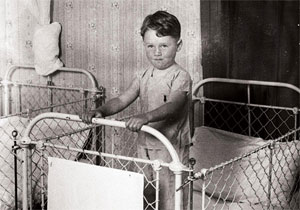
Greens senator Bob Brown said he was "shocked and alarmed" by the allegations, heard today by the Senate Legal and Constitutional Committee's inquiry into a Stolen Generation Compensation Bill 2008.
On the first day of hearings in Darwin today, Kathleen Mills from the Stolen Generations Alliance said the public did not know the full extent of what happened to some children.
And efforts to obtain records that support the claims, such as that children were injected with serums to gauge their reaction to the medication, had been hampered, she said.
"These are the things that have not been spoken about," Ms Mills told the inquiry.
"As well as being taken away, they were used ... there are a lot of things that Australia does not know about."
Outside the inquiry, Ms Mills said her uncle had been a medical orderly at the Kahlin Compound in Darwin.
She said he told her that children were used as "guinea pigs" for leprosy treatments.
"He said it made our people very, very ill ... the treatment almost killed them," she said.
"It was a common experience and a common practice ...
"People are very inhibited to speak about their experience and it is not a nice subject ... I don't want them to be shamed."
Senator Brown said it was important to get to the bottom of the claims, which he called "very, very serious".
"It may be right, it may not," he said.
"It needs investigation. If within the indigenous community there is a feeling that children may have been experimented upon for a treatment for leprosy or anything else, the air needs to be cleared."
Ms Mills said information to do with the testing would be in health department archives and she called on the government to assist "opening Pandora's box".
She also said it was important to work with indigenous groups to ascertain who is eligible for compensation.
"It has to happen ... but there's this reluctance to do it," she said.
"We don't have the necessary information ... it's probably tucked away in some archive but we don't have the resources to research, we don't have the people who are qualified."
Senator Brown said there was a national responsibility to help Aboriginal people to get to all the records, including those being held by church institutions.
"This is about their identity, this about their sense of being, their history," he said.
The compensation bill aims to pay money to victims of the stolen generations, including living descendants, out of a Stolen Generations Fund.
Ex gratia payments would be set at $20,000 as a common experience payment with an additional $3,000 for each year of institutionalisation.
Rodney Dillon, from the National Sorry Day Committee, said that while the government debated action more Aboriginal elders entitled to some form of compensation were dying.
"We are going to lose a lot of people between now and the next time this bill is put on the table," he said.
"Although it does not have all the things in it we would like, I think we should push ahead."
Zita Wallace, chairperson of the Stolen Generations Alliance, said it was time to act "with urgency".
"Because I know we are dying and all of us elders from the first generation we will be all gone ... maybe the government would wish that would happen, then they would not have to pay compensation."


